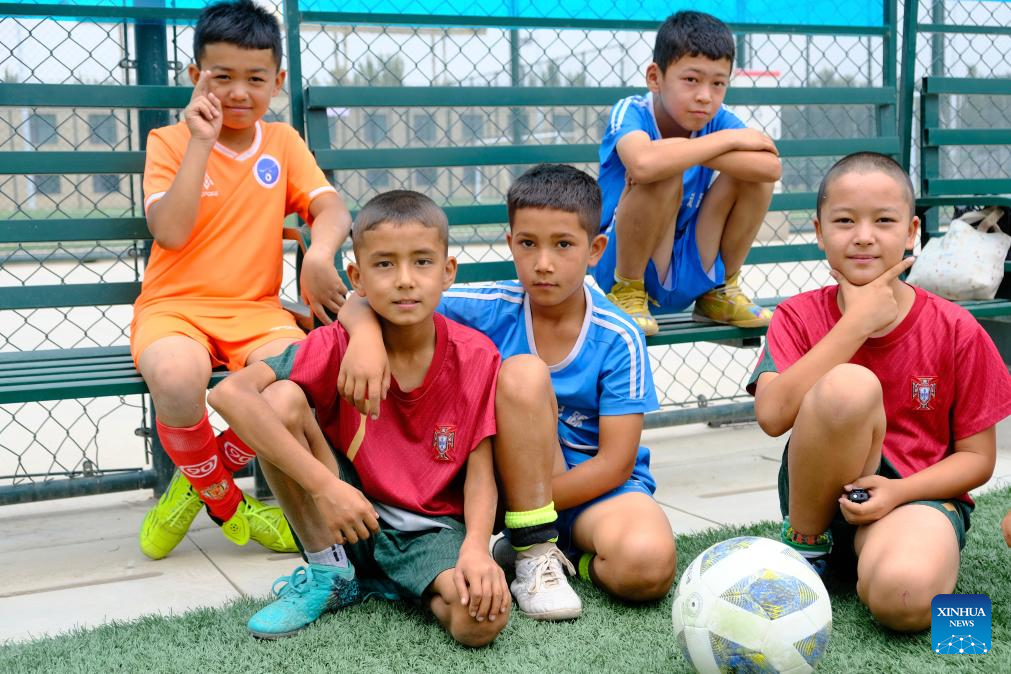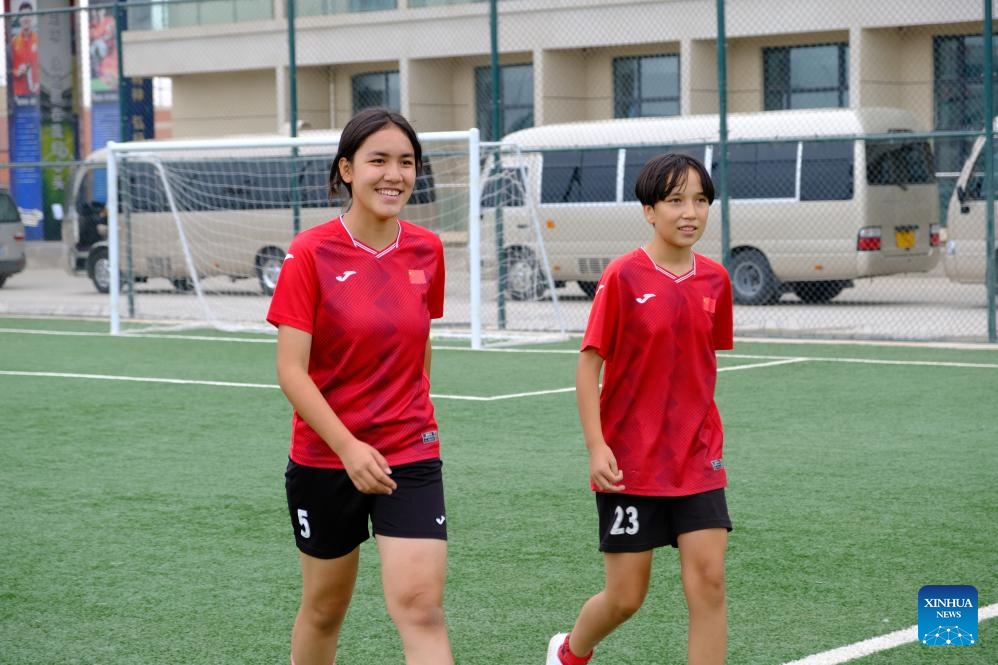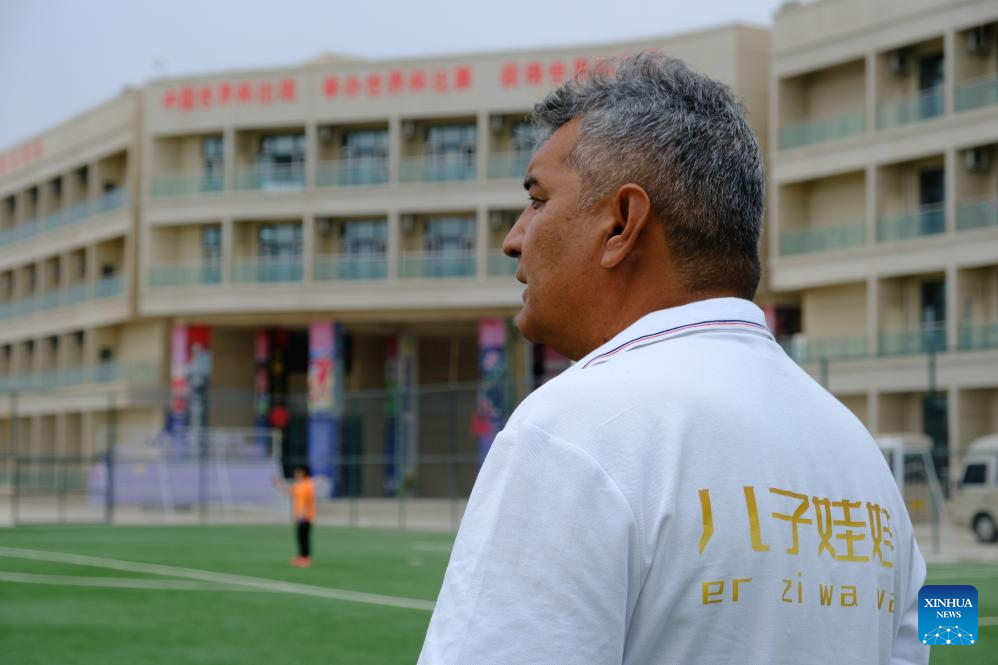Xinjiang Story: Grapevine goalpost and the making of young footballers
Source: Xinhua
Editor: huaxia
2025-09-18 14:52:16

Football players from the "Er Zi Wa Wa" club pose for a group photo at a youth football training base in Kashgar, northwest China's Xinjiang Uygur Autonomous Region, Aug. 15, 2025. (Xinhua/Tan Yixiao)
URUMQI, Sept. 18 (Xinhua) -- "Once you can walk, you can play football," is a saying originating from Kizilsu Kirgiz Autonomous Prefecture in northwest China's Xinjiang Uygur Autonomous Region, where football first arrived in the 19th century.
To this day, the phrase still rings familiar across this region and beyond.
In the neighboring city of Kashgar, Memetjang Mahmut has witnessed that passion firsthand since he began coaching at a local secondary school in 1995 -- where he was amazed by how naturally the children embraced the game.
"They don't care if it's a hill, an alley or a dry riverbed," he said. "As long as there are enough kids, the match begins."
In 1997, Memetjang tore down the grape arbor at his home and set up a makeshift goalpost in the schoolyard. In those early years, training conditions were harsh and equipment scarce -- no green turf and no proper shoes. Children practiced shuttle run with tires taken from abandoned donkey carts attached to their bodies, while weaving their way through a line of sticks jammed into the bare earth.
From those scrappy early games was born the "Er Zi Wa Wa" club in 2012, with this name meaning brave and true in Uygur. The first squad had just 28 children.
In 2023, notably, what began in dusty alleys and on dirt fields was rewarded with a significant gift -- a professional training base.
Under China's national "pairing assistance" program, launched in 1997 to bring financial, technical and human resource support in various fields to Xinjiang from other regions of China, the city of Shenzhen in south China's Guangdong Province invested 100 million yuan (about 14.07 million U.S. dollars) in building a youth football training base in Kashgar.
This base features 14 various sports fields, including three FIFA Quality Pro-certified 11-a-side pitches. It also has dormitories, a canteen, rehabilitation rooms and tactical classrooms.
Since opening, the base has welcomed more than 43,000 trainees, mainly students aged 8 to 16 from over 70 primary and secondary schools across the city.
"All local children attending the base enjoy free meals and accommodation -- with the government investing five million yuan annually to support operations and training," said Yang Jinzi, office director of the training base.
Sawur Jesur, aged 10, remembers kicking a ball barefoot on dirt roads and going home with scabbed knees and covered in dust. Now, training at the base under the guidance of coaches from Shenzhen, he is doing drills and learning tactics he once only saw and heard about on TV.
"I want to play in Beijing because it is the capital," he said, eyes bright with ambition. "One day, I want to join the national team."
Today, the "Er Zi Wa Wa" club has grown to more than 160 players. Notable players from this club -- such as Afrden Asqer, Mutellip Iminqari and Abraham Halik, have made it into various age groups of China's national team.
Girls in this region, however, face a steeper climb. "Many parents here still don't support girls playing football, thinking it's a sport for men," said coach Memetjang.
Thirteen-year-old Hawanisa Ayilet proved them wrong. She sneaked into club tryouts three years ago, won a place in the squad, and only confessed to her parents later.
Hawanisa has since traveled to many places for matches, playing in cities such as Shanghai and Shenzhen.
Apart from training with the team, she also practices at home, and the kids who play nearby all know her.
"They had never seen a girl play football before. Now they call me 'Cristiano Ronaldo,'" she said with a grin. ■

Thirteen-year-old Hawanisa Ayilet (L) and her teammate get ready for football training at a youth football training base in Kashgar, northwest China's Xinjiang Uygur Autonomous Region, Aug. 15, 2025. (Xinhua/Tan Yixiao)

Memetjang Mahmut trains young football players at a youth football training base in Kashgar, northwest China's Xinjiang Uygur Autonomous Region, Aug. 15, 2025. (Xinhua/Tan Yixiao)



